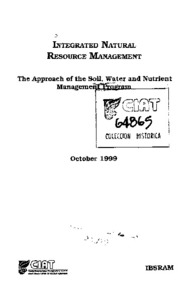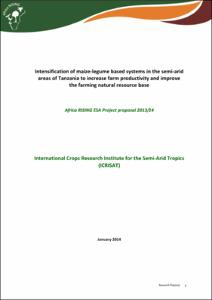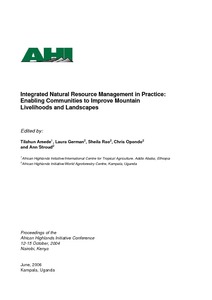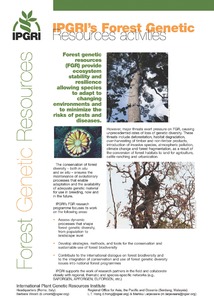Integrating research on food and the environment: An exit strategy from the rational fool syndrome in agricultural science
The thesis of this paper is that the "rational fool" syndrome can be applied to mainstream public sector agricultural research that is conducted in a way that is rational in the short term, but acts against its own long-term viability. Historically, a main concern of such research has been to maximize high levels of food production together with low prices to consumers. As a result, mainstream agricultural science has ignored negative impacts or externalities, which has contributed to a crisis of credibility with the general public and politically sensitive decision makers.
Intensification of maize-legume based systems in the semi-arid areas of Tanzania to increase farm productivity and improve the farming natural resource base: Africa RISING ESA Project proposal 2013/14
Inter-connection between land use/land cover change and herders’/farmers’ livestock feed resource management strategies: A case study from three Ethiopian eco-environments
We assessed land use/land cover changes from remotely sensed satellite imagery and compared this with community perceptions on availability/use of livestock feed resources and feed deficit management strategies since the 1973s in three districts representing the pastoral, agro-pastoral and mixed crop-livestock eco-environments of Ethiopia.
Irrigation infrastructure for sustainable and improved agricultural productivity. Topic Guide
Investigación en sistemas agropastoriles: antecedentes y estrategias
Kemiskinan dan desentralisasi di Kutai Barat: dampak otonomi daerah terhadap kesejahteraan Dayak Benuaq
Laporan penelitian ini menyajikan hasil penelitian lapangan yang dilakukan di Kutai Barat, Kalimantan Timur sebagai bagian dari proyek Menjadikan Pemerintah Daerah Lebih Tanggap Terhadap Kemiskinan: Pengembangan Indikator dan Alat untuk Mendukung Pengembangan Penghidupan yang Berkelanjutan dalam Desentralisasi yang didanai CIFORBMZ. Laporan menunjukkan bahwa dampak otonomi daerah terhadap kesejahteraan Dayak Benuaq, masyarakat yang bergantung pada hutan, kelompok mayoritas masyarakat di Kutai Barat.
IWRM [Integrated Water Resources Management] in Uganda - progress after decades of implementation
Uganda lies almost wholly within the Nile Basin and is a country characterised as well-endowed with water resources. Receiving considerable inflows of aid since the early 1990s, some of this aid emerging after the 1992 Earth Summit in Rio de Janeiro enabled the country to begin a process of Integrated Water Resources Management (IWRM), taking the lead from Chapter 18 of Agenda 21.







